

La bonne gouvernance : L’arme fatale contre le terrorisme. Le terrorisme prétextant la religion musulmane était inconnu au Mali jusqu’à son importation ces dix dernières années par des étrangers, dont les salafistes algériens fondateurs de la nébuleuse AQMI.

A partir de 2012, pendant l’envahissement du nord du pays, ces obscurantistes ont réussi à embarquer dans leur projet machiavélique un grand nombre de jeunes maliens de tous horizons. Aujourd’hui, les nationaux se comptent dans toute la multitude de groupes terroristes qui infeste le Mali et Sahel. Malgré les mesures à visées militaires qui engloutissent les maigres ressources de nos pauvres Etats, le terrorisme continue son expansion. NATO Review - Is counter- terrorism good value for money? The material cost of a suicide bombing is as low as US$150.

This modest investment will result in an average of 12 deaths and spread fear throughout the targeted population. The developed world is responding to the threat of fundamentalist Islamic terrorism by building ever-bigger, ever-better fortifications around key targets. Entry to airports and embassies is more difficult; key landmarks are blocked from potential bombers. Since 2001, the world has spent about US$70 billion on increased homeland security measures. Predictably, this has reduced the number of trans-national attacks by about 34 per cent. The rise in the death toll has occurred because terrorists are responding rationally to the higher risks imposed by greater security measures. Research recently commissioned for the Copenhagen Consensus project concludes that target nations are overspending on measures that shift the risk of attack instead of reducing it.
Terrorisme : les trois "angles morts" qui inquiètent le renseignement. How Can World Leaders End Terrorism? A&Q is a special series that inverts the classic Q&A, taking some of the most frequently posed solutions to pressing matters of policy and exploring their complexity.
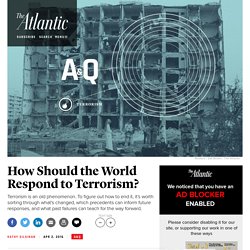
March alone saw a string of major terrorist attacks around the world—including in Ivory Coast, Belgium, Pakistan, Iraq, and Turkey—that together killed more than 100 people. The drumbeat of attacks seems horrifyingly constant, and underscores the fact that nearly 15 years since the United States launched its so-called global war on terror, victory is nowhere in sight. How Tech Is Helping Us Fight Terrorism. Lately, a week doesn’t pass without reports of a terrorist attack flooding the news — there is a sinking realization that terrorism and martyrdom are gaining traction as an effective means of expressing ideology or political dysfunction.
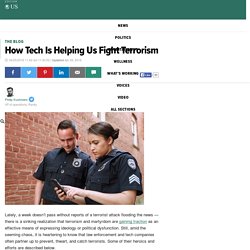
Still, amid the seeming chaos, it is heartening to know that law enforcement and tech companies often partner up to prevent, thwart, and catch terrorists. Some of their heroics and efforts are described below. The New ISIS Insurgency: What Jihadists Do After Losing Territory. France vs. Jihadism: The Republic in a New Age of Terror. FT.com. Le Brexit désarme la défense européenne. À l'occasion de l'Université d'été de la défense organisée à Paris, Jean-Yves Le Drian a appelé à surmonter cette période délicate pour les capacités militaires de l'UE en prenant des initiatives fortes d'ici à la fin de l'année.
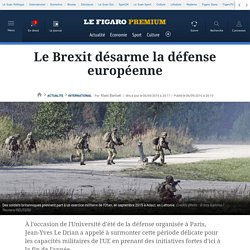
Armée européenne: beaucoup de bruit pour rien ? – EurActiv.fr. Avec le Brexit, la création d’une « armée européenne » est de plus en plus évoquée.

Mais malgré les déclarations solennelles, les analystes n’y croient pas. Un article du réseau EurActiv. Depuis le référendum britannique, les échanges de François Hollande avec ses homologues européens se sont concentrés sur la solidarité européenne en matière de défense, un sujet longtemps bloqué par Londres. Cybersecurity: the case for a European approach. At the June Summit, which will take place after the UK Referendum, the High Representative of the Union for Foreign Affairs and Security Policy, Federica Mogherini, will present the results of her global review of external strategy.
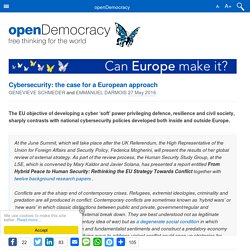
As part of the review process, the Human Security Study Group, at the LSE, which is convened by Mary Kaldor and Javier Solana, has presented a report entitled From Hybrid Peace to Human Security: Rethinking the EU Strategy Towards Conflict together with twelve background research papers . Conflicts are at the sharp end of contemporary crises. Refugees, extremist ideologies, criminality and predation are all produced in conflict. Comment l'Union européenne lutte-t-elle contre le terrorisme ? Les contradictions de la lutte antiterroriste européenne. Pourquoi la France perd dans la lutte antiterroriste. Par Kevan Saab.

Manuel Valls (Crédits : Parti Socialiste, CC BY-NC-ND 2.0) On savait que le répit serait de courte durée, mais c’est encore une fois avec un carnage sur le sol national que le terrorisme retourne sous le feu des projecteurs. Après les attaques du 13 novembre 2015 et la tuerie de Charlie Hebdo, l’attentat de Nice porte à plus de 240 morts depuis 2012 le bilan des attaques terroristes. Is Europe ready to deal with cyber terrorism? — Debating Europe. Is Europe’s reliance on technology making us more vulnerable?
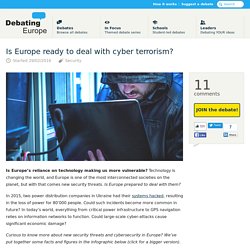
Technology is changing the world, and Europe is one of the most interconnected societies on the planet, but with that comes new security threats. Is Europe prepared to deal with them? In 2015, two power distribution companies in Ukraine had their systems hacked, resulting in the loss of power for 80’000 people. Time for an EU Counterterrorism Agency. During the Globsec conference on April 15–17, the audience was asked whether it was time for the EU to have its own intelligence agency.
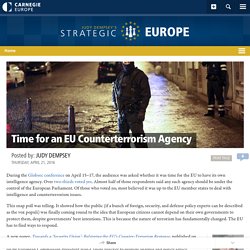
Over two-thirds voted yes. Almost half of those respondents said any such agency should be under the control of the European Parliament. Of those who voted no, most believed it was up to the EU member states to deal with intelligence and counterterrorism issues. This snap poll was telling. It showed how the public (if a bunch of foreign, security, and defense policy experts can be described as the vox populi) was finally coming round to the idea that European citizens cannot depend on their own governments to protect them, despite governments’ best intentions. A new paper, Towards a ‘Security Union’: Bolstering the EU’s Counter-Terrorism Response, published on April 20 by the European Political Strategy Centre (EPSC), takes up this issue.